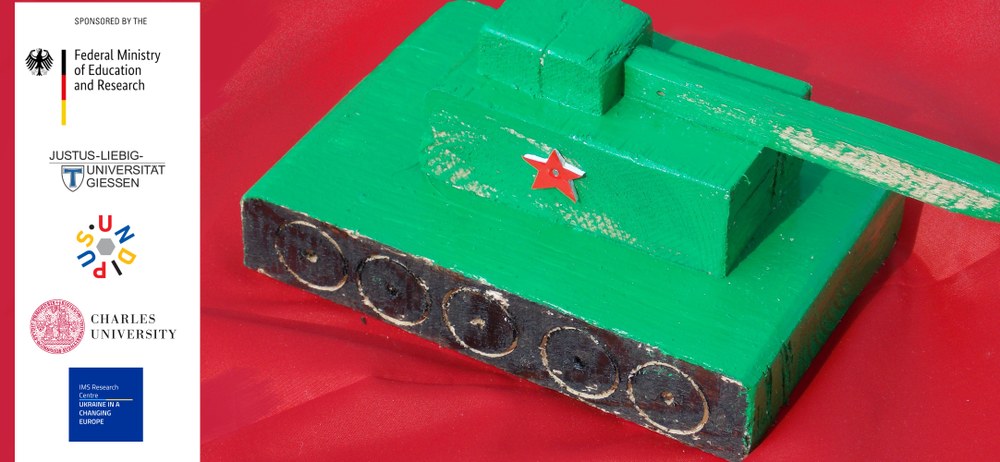CALL FOR APPLICATIONS
Re-Thinking Post-Socialist War(s): Comparative Dimensions of the War in Ukraine (2014-2024)

Where: Justus Liebig University Giessen, Germany
When: 8-10 March 2024
Organizers: Justus Liebig University Giessen, UNDIPUS joint project, Charles University in Prague, IMS Research Centre “Ukraine in a Changing Europe”
Funded by the Federal Ministry of Education and Research
The end of February 2024 will mark ten years since the beginning of the war in Ukraine—heralded by an (almost) non-violent annexation of Crimea in March 2014 and culminating in an all-out war launched by Russia in February 2022. During this period, the war, which brought about massive destruction of human lives, ecosystems, and infrastructure, as well as large-scale displacement, became part
and parcel not only of the global agenda in journalism, politics, culture, and academic research, but also a crucial factor in cultural production and identity formation.
Our interdisciplinary conference “Re-Thinking Post-Socialist War(s): Comparative Dimensions of the War in Ukraine (2014-2024)” aims at conceptualizing the repercussions of this highly traumatic event that changed the lives of millions of people in Ukraine and also became a game-changing factor on a global scale. It is a collaborative effort between the Justus Liebig University Giessen and the Charles University in Prague, which will be hosted at the University of Giessen on 8-10 March 2024 as part of the joint project “UNDIPUS—(Un)Disciplined: Pluralizing Ukrainian Studies—Understanding the War in Ukraine” (funded by the Federal Ministry of Education and Research; subproject “After Masculinity: Female Perspectives on the War in Eastern Ukraine”). As the title suggests, rather than focusing on the war’s idiosyncrasy, we will instead juxtapose it to other typologically comparable military conflicts in order to grasp their convergences and divergences. Premising on that, we are also going to discuss the possible peacebuilding strategies and compare them to the relevant experiences observed in other countries and cultures.
Our guiding questions are (i) what enabled armed conflicts (and the war in Ukraine in particular) as legitimate tools for achieving (geo)political goals; (ii) how warfare (co-)produced certain social and cultural practices that transformed implicated actors and polities or (iii) which social, cultural, and economic factors possibly prefigured the emergence and the perpetuation of warfare; (iv) finally, how the post-socialist and post-dependency wars were framed—in warring countries and in third states; by victims and by aggressors—and how those framings, in turn, reshaped identities of the involved sides?
We welcome applications from researchers specializing in literary and cultural studies, philosophy, history, political studies, sociology, and other related disciplines, especially with a focus on postcolonial and gender studies, comparative history, and peace and conflict studies, who could contribute to the topics delineated above.
To take part in the conference, please send your application containing your name, academic degree and position, the topic and the short abstract of your talk (up to 400 words) until October 20, 2023 to oleksandr.chertenko@slavistik.uni-giessen.de (Oleksandr Chertenko) and/or ukrainianstudies.ims@fsv.cuni.cz (Valeria Korablyova). Alternatively, a panel proposal with three to four paper presentations could be submitted, too. The applicants will be notified whether their applications are accepted by November 10, 2023. The organizers will be able to cover the traveling and accommodation costs of the contributors. We kindly ask you to indicate if you need such funding in your application. The conference language is English.
The organizers also envisage publishing a post-conference open-access edited volume with extended versions of selected papers.
You can find a more detailed description here.
